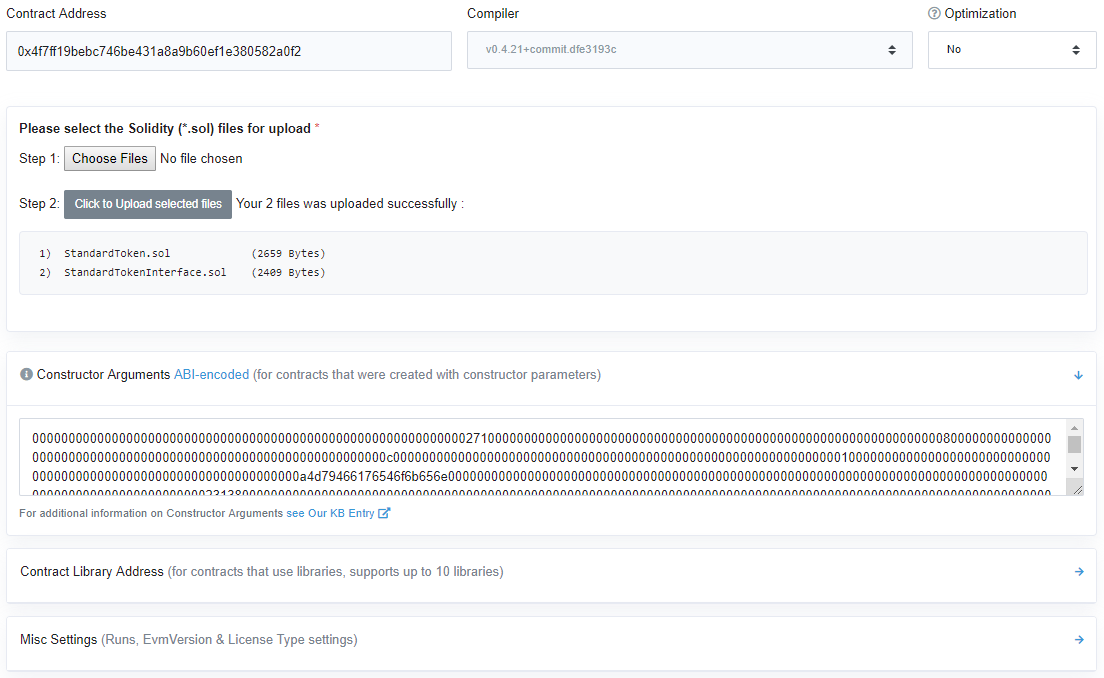I managed to deploy a token contract with interface on Kovan Testnet.
Now I wanted to verify the code. However this is a bigger problem than I thought.
The contract got successfully deployed to: https://kovan.etherscan.io/address/0x4f7ff19bebc746be431a8a9b60ef1e380582a0f2
For verification I choose the multi-file verification in etherscan. Because the main contract imports and interface (see code below).
Here are the fields that I filled in during the verification process:
After sending the request I got the following error:
The website showed the expected and the given bytecode. Both of the bytecodes look extremely similar. However I noticed a few characters are different. Has anyone of you an idea what the error might be?
I already linked to the deployed contract. Here is the contract code:
Standardcontract.sol
pragma solidity ^0.4.21;
import "./StandardTokenInterface.sol";
contract StandardToken is StandardTokenInterface {
uint256 constant private MAX_UINT256 = 2**256 - 1;
mapping (address => uint256) public balances;
mapping (address => mapping (address => uint256)) public allowed;
/*
NOTE:
The following variables are OPTIONAL vanities.
*/
string public name; //fancy name: eg Simon Bucks
uint8 public decimals; //How many decimals to show.
string public symbol; //An identifier: eg SBX
function StandardToken(
uint256 _initialAmount,
string _tokenName,
uint8 _decimalUnits,
string _tokenSymbol
) public {
balances[msg.sender] = _initialAmount; // Give the creator all initial tokens
totalSupply = _initialAmount; // Update total supply
name = _tokenName; // Set the name for display purposes
decimals = _decimalUnits; // Amount of decimals for display purposes
symbol = _tokenSymbol; // Set the symbol for display purposes
}
function transfer(address _to, uint256 _value) public returns (bool success) {
require(balances[msg.sender] >= _value);
balances[msg.sender] -= _value;
balances[_to] += _value;
emit Transfer(msg.sender, _to, _value); //solhint-disable-line indent, no-unused-vars
return true;
}
function transferFrom(address _from, address _to, uint256 _value) public returns (bool success) {
uint256 allowance = allowed[_from][msg.sender];
require(balances[_from] >= _value && allowance >= _value);
balances[_to] += _value;
balances[_from] -= _value;
if (allowance < MAX_UINT256) {
allowed[_from][msg.sender] -= _value;
}
emit Transfer(_from, _to, _value); //solhint-disable-line indent, no-unused-vars
return true;
}
function balanceOf(address _owner) public view returns (uint256 balance) {
return balances[_owner];
}
function approve(address _spender, uint256 _value) public returns (bool success) {
allowed[msg.sender][_spender] = _value;
emit Approval(msg.sender, _spender, _value); //solhint-disable-line indent, no-unused-vars
return true;
}
function allowance(address _owner, address _spender) public view returns (uint256 remaining) {
return allowed[_owner][_spender];
}
}
StandardInterface.sol
pragma solidity ^0.4.21;
contract StandardTokenInterface {
/* This is a slight change to the ERC20 base standard.
function totalSupply() constant returns (uint256 supply);
is replaced with:
uint256 public totalSupply;
This automatically creates a getter function for the totalSupply.
This is moved to the base contract since public getter functions are not
currently recognised as an implementation of the matching abstract
function by the compiler.
*/
/// total amount of tokens
uint256 public totalSupply;
/// @param _owner The address from which the balance will be retrieved
/// @return The balance
function balanceOf(address _owner) public view returns (uint256 balance);
/// @notice send `_value` token to `_to` from `msg.sender`
/// @param _to The address of the recipient
/// @param _value The amount of token to be transferred
/// @return Whether the transfer was successful or not
function transfer(address _to, uint256 _value) public returns (bool success);
/// @notice send `_value` token to `_to` from `_from` on the condition it is approved by `_from`
/// @param _from The address of the sender
/// @param _to The address of the recipient
/// @param _value The amount of token to be transferred
/// @return Whether the transfer was successful or not
function transferFrom(address _from, address _to, uint256 _value) public returns (bool success);
/// @notice `msg.sender` approves `_spender` to spend `_value` tokens
/// @param _spender The address of the account able to transfer the tokens
/// @param _value The amount of tokens to be approved for transfer
/// @return Whether the approval was successful or not
function approve(address _spender, uint256 _value) public returns (bool success);
/// @param _owner The address of the account owning tokens
/// @param _spender The address of the account able to transfer the tokens
/// @return Amount of remaining tokens allowed to spent
function allowance(address _owner, address _spender) public view returns (uint256 remaining);
// solhint-disable-next-line no-simple-event-func-name
event Transfer(address indexed _from, address indexed _to, uint256 _value);
event Approval(address indexed _owner, address indexed _spender, uint256 _value);
}
And here are the constructor arguments that I used:
10000, "MyFavToken", 18, "MFav"


